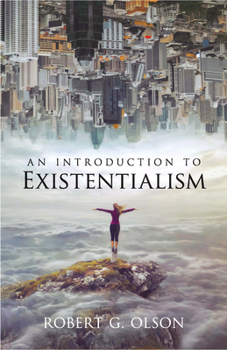An Introduction to Existentialism
Select Format
Select Condition 
Book Overview
"The best book on this subject that I have so far read; it genuinely does what its title implies." -- Philosophical Books
"Should be of great help in dispelling some of the mystery that surrounds the subject." -- Review of Metaphysics
At one time or another almost everyone has reflected upon the major existentialist themes: the sources of despair and suffering, the triumph over adversity, the nature and limits of reason, the encounter...
Format:Paperback
Language:English
ISBN:0486200558
ISBN13:9780486200552
Release Date:March 2017
Publisher:Dover Publications
Length:240 Pages
Weight:1.20 lbs.
Dimensions:0.5" x 5.4" x 8.5"
Customer Reviews
4 ratings
Mostly Heidegger & Sarte--scholarly & readable
Published by Thriftbooks.com User , 15 years ago
The author elucidates the basic elements of Existentialism, contrasting them with traditional philosophy & esp. American Pragmatism; chapters cover: Value Orientation (traditional vs. existentialist), The Human Condition (anguish & being), Reason & Unreason (epistemologies), Freedom (vs. determinism), Authenticity (Heidegger vs. Sarte), The Other (existence & authenticity), & Death (Heidegger vs. Sarte). He focuses on Heidegger & Sarte but addresses others too--pointing out Existentialism's ups & downs. I prefer Sarte: p. 211: "The very act of freedom is therefore the assumption & creation of finitude...the `individual' is the man who has the courage to make authentic decisions" though I'd say finitude creates freedom. Existentialism revolves around human freedom with some parallels to Freud; Olson ignores Jung though Existentialist in-itself/for-itself parallel Jung's unconscious/conscious minds & Buddhist absolute/relative being--Existentialists are dualists vs. mystical unio mystica/Spinoza's monistic approach. IMHO Existentialists make many good points (e.g. human dignity vs. predestination) but fail to properly extrapolate/interpret them. As Olson states--pp. 187-8: "Pragmatists say existentialists overgeneralize." More specifically, they constantly argue dichotomies whereas the universe is spectral--shades of gray vs. just black & white. Thus, their views are simplistic. For example, Existentialists assert that consciousness depends on suffering--but this is just a special case because experiences depend on contrast--one can only perceive something via contrast--you can't see a polar bear in a snowstorm or a black cat on a moonless night. Further, they make many value judgments--suffering the pitfall of attribution (assume all people are like Existentialist philosophers)--whereas Jung's typology (Psychological Types (Collected Works of C.G. Jung, Volume 6)), for example, demonstrates human differences (further, how do Extra-terrestrials think?). Assuming homo sapiens are the ultimate beings is simplistic & egocentric; to state that thinking people are always conscious is absurd. Also, I submit that societal conventions are not truths (pp. 79-80). As Olson argues, p. 33: "Genuine knowledge is invariably a knowledge of a recurrent type of relationship between two or more kinds of particular beings under similar circumstances." Per Knowledge Management, context is necessary for knowledge, understanding, meaning, & decisions. Also p. 125: "The mistake of the existentialists is similar to that of philosophers in the classical tradition. They pushed a concept to its very limits & found themselves with nothing but a meaningless & self-contradictory concept on their hands." For example, unlike Montague in The Ways of Knowing or the Methods of Philosophy, philosophers usually have uni-epistemological belief systems. Antithetically, Science is, at worst, bi-epistemological, counterbalancing philosophica
A good introduction to existentialism
Published by Thriftbooks.com User , 18 years ago
i read the 1962 version--and apparently the text was never updated (but it has stayed in print). i found it a useful and clear presentation of the subject. the first twenty pages are worth the purchase, as the author is very good at orienting existentialism within the context of other philosophies. the chapters on anguish and freedom are especially good. some of the text's language is archaic. phrases such as the "common man" and the exclusive use of the male pronoun are used throughout. these are a bit distracting to the contemporary feminist trained ear, and reminds one of the sexist sensibilities of even the best educated individuals in the early 1960s. if one wants a literary-critical (as opposed to a strictly philosophical) reflection on existentialism, i would recommend TO DENY OUR NOTHINGNESS by maurice friedman. also written in the 1960s, friedman's book is a profound critical reflection on existential novels and poetry popular in his day (such as camus' THE PLAGUE and the novels of herman hesse).
This book isn't bad but...
Published by Thriftbooks.com User , 19 years ago
if you want a literary introduction to Existentialism, not bogged down by complexities, read a book like 'Toilet: The Novel' by Michael Szymczyk, or 'Siddhartha and Goldmund' by Herman Hesse. Otherwise, for an introduction to the Philosophy, check this one or Walter Kauffman's book.
An Excellent Examination of Existentialism
Published by Thriftbooks.com User , 25 years ago
Robert G. Olson does justice to the philosophy of Existentialism in his stellar novel, "An Introduction to Existentialism". By examining each individual aspect of the Existentialist interpretation and also introducing the main arguments against Existentialist points, Olson helps to create a solid base for the novice philosopher. Utilizing the works of Sartre, Hegel, Kierkegaard, Hursserl and Marx, the novel gives in depth analysis and conclusionary support to even the most complex areas of Existentialist thought. This novel makes one question the conformist views of our society while presenting an alternative solution through Existentialism.





